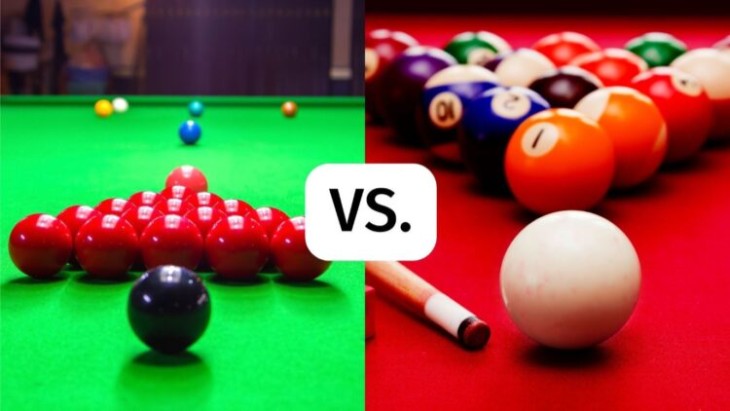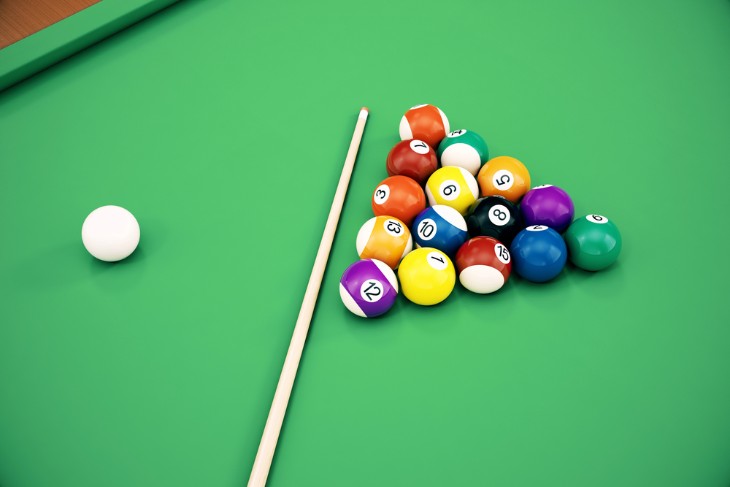Both Snooker and Pool are popular cue sports that enjoy a lot of recognition and following. They have similarities, including using cues and balls on a felt-covered table, but they are essentially different games. This paper will extensively discuss the differences between Snooker and pool, including equipment used, objectives and rules of each game, and skill and strategy involved. By the end of this piece, you will clearly understand why these two sports are not one.
Table Size And Dimensions
The first major difference between Snooker and pool is the size of the table. Snooker has a much bigger table than Pool. A normal snooker table is 12 feet by 6 feet in dimension. The bigger playing area requires more skill and precision because players have to make calculated moves over long distances on the table. Also, pockets on a snooker table tend to be smaller and more rounded, making potting balls challenging.
On the other hand, pool tables are more petite than snooker tables. The standard size for most pool tables is 9 feet by 4.5 feet, though alternative ones exist, such as those measuring eight or even 7 feet long. Smaller tables mean faster games that can be played by anyone who happens to them casually. Meanwhile, pocket holes on pool tables are more prominent with more angular edges, so it's easier to do just that.
Pool tables being smaller means games are typically quicker due to less distance between balls during play, unlike in Snooker, where balls may have to be struck for them to cross from one point to another easily due to shorter distances. Such speed attracts many people, making it popular in bars or recreational clubs. For instance, players do not need to hit powerfully when striking since their target points are far apart.
The size and dimensions of these two games' playing surfaces play a significant role in their nature of play. Snooker requires more care and strategizing because it is played on larger tables with smaller pockets. Speed and accessibility are the focus of the pool, which uses a smaller table and more oversized pockets. The two tables' sizes are one reason why they seem like entirely different games.
Balls And Their Colours
The balls used in Snooker differ from those used in the pool, not only in numbers but also in colours. In Snooker, there are 22 balls for each game, with one cue white ball, 15 red balls, and six coloured balls. The coloured ones are yellow, green, brown, blue, pink, and black, all with varying point values. For example, if you strike a yellow ball, you get two points, but once you hit a black ball, you earn seven points.
The number of Balls varies depending on what kind of pool is being played. A normal game of eight-ball pool has sixteen balls, including one white cue ball and fifteen object balls. These object balls come in two kinds: solids numbered 1-7, which are fully coloured, and stripes numbered 9-15, which are striped around them. The black number eight also plays a crucial role during play.
Many people play nine-ball pool, an alternative version of the game. Nine-ball requires using only nine balls numbered one through nine, respectively. The players must then pot these balls according to their numbering order until the ninth ball is potted, thus ending the game.
These differences in the balls and their colours cause different gameplay approaches. Snooker requires players to pot red balls first, followed by coloured ones in a predetermined sequence; this demands careful planning and strategy. The pool involves all solids or stripes being potted before the black ball in the eight-ball, or else all striped balls are pocketed for the nine-ball.
These disparities of balls and colours help shape the distinct challenges inherent in Snooker and the pool. Understanding these differences lets one know what it takes to play each game.

Rules and Objectives
There are notable differences between the rules and objectives employed by Snooker and pool games. HerHere'sat they entail:
- Snooker Rules and Objectives: Players aim to score the highest possible points in Snooker from potting balls arranged sequentially. The game starts with 15 red balls arranged in a triangle format while six coloured balls that must be placed on specific spots are also available on the table. For a start, you have to pot any of the fifteen red-coloured balls that will be within reach, after which you can attempt to sink any of the six differently coloured ones (each representing a specific score).
- Pool Rules and Objectives: The pool rules depend on which version is being played. In eight-ball cases, players must sink every ball assigned to them (either stripes or solids) before eventually sinking the eight ball legally to win the game. After the break, players choose their group of balls (solids or stripes) based on what they pocketed first. The winner in this pool game is the person who has cleared all their group of balls and then potted the 8-ball. Lastly, such a person is said to be victorious. In nine-ball pool games, players must begin by sinking the lowest numbered ball left on the table; hence, at the end of the match, any player makes legal hits towards nine balls, ending it and thus being declared victorious. Pool is a faster-paced game, often played only as single games rather than frames.
These distinctive rules and objectives influence how strategies and styles are developed in Snooker and Pool, giving each game its identity. This knowledge helps both players and fans appreciate the skills necessary for either sport.
Gameplay and Pace
The way snooker and pool are played changes significantly due to differences in gameplay and pace.
Snooker is usually a slow-paced game that requires strategic thinking. If you're aware of how many shots ahead you need to plan before deciding how to position your cue ball for subsequent plays over some number of moves—three main ones followed by an additional one, thus making up four moves—then I am sorry for you because nobody wants anything from those but papers.
Furthermore, larger tables with smaller pockets make accuracy even more demanding since precision control must be exerted through them when playing Snooker due to its peculiarities like extended matches lasting several hours consisting of multiple frames; such tournaments demand maximum stamina alongside concentration so as not only improve player's abilities within teams but deliver perfect results too—aimed students may benefit better results learning techniques used by good writers-can provide models writing them themselves rather than receiving already written works from someone else–which would be far less effective approach.
On the other hand, the pool is a game that is usually played faster. With smaller tables and wider pockets, it becomes easier to pocket balls, leading to fast games. For example, playing pool in an eight-ball or nine-ball format can be finished within minutes. This makes the pool more suited for amateurs and social events. The game's high speed also means players make quicker decisions and concentrate on immediate moves rather than long-term strategies.
The different speeds of each game affect how Snooker and Pool are perceived and enjoyed. Snooker appeals to those who appreciate its tactical approach in cue sports. It is all about being patient and accurate at the same time. On the other hand, those who like playing a dynamic and fast-moving game with a faster tempo often go for pool games as opposed to Snooker. The pool is perfect for casual gaming sessions as well as socialisation.
These two games differ significantly in gaming experiences both players and fans enjoy. Whether you prefer the strategic depth involved in playing Snooker or fast-paced action during pool matches, both sports present unique challenges, which make them quite enjoyable. Knowing these differences helps one value what each sport brings to the table.
Difference between Snooker and Pool in terms of Skill and Strategy
In skill and strategy, Snooker and pool are key disciplines, although they differ in nature and application.
Snooker requires strategic planning skills. Players must plan several shots to determine how each shot would be positioned for subsequent plays by the cue ball. Sno Snooker's roger tables with smaller pockets call for accuracy and delicate touches. In addition, they are correctly positioning the cue ball after every shot, which is essential in Snooker. This control enables players to retain a sequence of successful pots. Safety shots that place the cue ball in a difficult position for the opponent also form an integral part of snooker strategy. These aspects indeed make Snooker a game of patience and careful thinking.
Meanwhile, the pool demands quick thinking as well as instant precision play. The smaller table and more oversized pockets make potting of balls easier, but it still requires accuracy from players. Generally, players must decide quickly what their next shot will be in pool matches. The fast pace, therefore, involves some calculations at times, together with adjusting oneself based on how things on the table have changed. It is still essential to position the cue ball, but this is easier on a much smaller playing area than in Snooker. Pool players also use safety shots, though more emphasis is often placed on attack due to the game's speed.
Both games require skill mixed with strategy, but they put more emphasis on different aspects. Snooker is thus considered a strategic game because it is about long-term planning and precision. On the other hand, the pool can be portrayed as dynamic due to its prompt, accurate moves made with swiftness. Understanding these differences helps improve performance while appreciating what each sport entails. If you love thinking about tactics employed when playing Snooker or rapidity when hitting balls into holes during pool games, both provide great experiences.

Scoring Systems
The scoring systems in Snooker and Pool are different and influence how each game is played and won. Here's breakdown of each:
- Snooker Scoring System: In Snooker, balls are potted in a specific order, and points are awarded to the players. The game starts with 15 red balls, each earning one point. After potting a red ball, the player must pot a coloured ball that carries more points. They are given different values: yellow (2 points), green (3 points), brown (4 points), blue (5 points), pink (6 points) and black (7 points). That coloured ball is then placed back on the table before the player hits another red one and then hits another coloured one. The game ends when all the balls are potted. The highest score at the end of a frame wins it. Several frames make up most matches, thereby increasing the excitement and challenge.
- Pool Scoring System: The scoring system used in a pool game depends on the played version. Eight-ball pool is one such version of a game that does not use points. In this game, you have to legally sink the eight ball after taking all the stripes or solids into the assigned holes. It's like other straightforward win/loss games where as soon as a player pots the eight balls, then it's better. The nine-ball pool requires you to pot them numerically, starting from the lowest number. The person who manages to do so wins the entire match when they potted the nine balls last without any cumulative points but only focused on racing against each other to shoot the money ball. That makes it possible for pool games to be scored faster and more efficiently.
These different scoring systems shape the strategies and excitement in each game. Sno Snooker sint system is complex and needs careful planning and consistent play by players, with high scores for precision shots that are well controlled. Pool, however, has more straightforward scoring and encourages fast, aggressive play, making it accessible and exciting. This knowledge can help players and fans better understand Snooker and pool by appreciating their unique aspects as well as challenges posed by them both through understanding the rules of scoring systems of these two common cue sports in most countries across planet earth, hence enabling them to make choices based on preference rather than ignorance.
Popularity and Cultural Impact
The popularity of Snooker varies from country to country, and its cultural impact also differs. The United Kingdom and some members of her Commonwealth strongly favour Snooker. Huge crowds converge at significant events such as the World Snooker Championship, which receives a lot of media coverage, too. This sport is recognised for its high-level skill requirements combined with accuracy, which dates back to the 19th century; moreover, the United Kingdom has snooker clubs that anyone can join despite age differences among potential learners/players. Professional snooker players such as Ronnie O'Sullivan and Stephen Hendry are household names, and many celebrate their achievements.
Pool has a broader international appeal, primarily in the U.S.A. It is one of the most widely played games in bars, recreational centres, and homes, making it easily accessible to many people. The pool is often seen as a social, casual game usually played for fun and enjoyment among friends. Additionally, there are professional pool events, such as the U.S. Open Nine-Ball Championship, where top players compete and attract massive attention from fans. This makes it easier to maintain popularity since it appears in many movies, television programs and music videos.
The two sports games have different cultural impacts. Snooker is usually considered a more formal and prestigious game involving tradition and professional excellence. On the other hand, the pool has always been considered an amusing, friendly game in social setups where people come together to enjoy themselves through this kind of entertainment. Finally, looking at each sport's significance indicates the historical context that created these sports, their play mechanism, and their respective use locations today.
They understand Snooker and Pool popularity and cultural impact, highlighting why these games continue to thrive and attract new players and fans. Both sports have much to offer, depending on whether you prefer strategic depth or a lively atmosphere alone.
Bottom Line
Snooker and pool are two forms of cue sports that share some similarities but also differ. From table size and balls used to rules, gameplay, and scoring systems, each game has something different to offer. Grasping these distinctions can develop your interest in them and assist you in choosing the one that seems best suited for playing or watching.
For more information:




.webp)


 (1).webp)




















